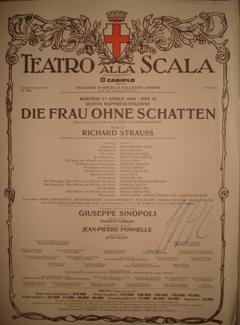Richard Strauss - Die Frau Ohne Schatten (Sinopoli) [1999]
Richard Strauss - Die Frau Ohne Schatten (Sinopoli) [1999]

1. Act I 2. Act II 3. Act III Jon Frederic West – Der Kaiser Inga Nielsen – Die Kaiserin Alan Titus – Barak, Der Farber Luana DeVol – Die Farberin Reinhild Runkel – Die Amme Eike Wilm Schulte – Der Geisterbote Orchestra & Choir Teatro alla Scala Giuseppe Sinopoli – conductor Milano, 14.04.1999.
Die Frau ohne Schatten ("The Woman without a Shadow"), the third of Richard Strauss' collaborations with Hugo von Hofmannsthal, is an ambitious mixture of operatic elements, both musically and dramatically. The story is part parable, part quest, and part human drama in which love and character are put to the test; the readiest comparison is to Mozart's The Magic Flute (Hofmannsthal, in fact, was the first to make the connection), with its veneer of comedy removed. Based on a fairytale by Wilhelm Hauff, Die Frau ohne Schatten traces the fortunes of a childless fairy empress whose desire for a "shadow" (fertility) drives her to consider stealing the desired qualities from an unhappy mortal woman. However, she cannot bring herself to do so, and eventually gains her own shadow by developing kindness and understanding.
Hofmannsthal created a libretto of such symbolic and textual complexity that he himself had trouble keeping it straight -- in fact, he wrote a concurrent prose version that allowed him to develop the themes more fully; this prose explanation sometimes accompanies the opera in performance to assist audiences. The correspondence between the librettist and Strauss shows that the composer, at times, often did not "get it" either.
The richness and complexity of Hofmannsthal's writing inspired Strauss to compose one of his densest scores, packed with intricate leitmotifs and exploiting his orchestrational talents to the fullest. In fact, it is perhaps only Strauss' ability to exploit the colors and textures of the orchestra that prevents Hofmannsthal's tale from lapsing into silliness; how many composers can pull off a chorus of unborn children that sings through the mouths of fish frying in a pan without straying into unintentional comedy?
Die Frau receives regular performances, but it has never established itself in the hearts and minds of opera-goers in the same was as Strauss' other stage works. Certainly this is partly due to the cryptic libretto, but it is also a testimony to the difficulty of the vocal writing. The role of the emperor calls for a true heldentenor, and the singers often have to compete with an orchestra of formidable size: Strauss employs quadrupled woodwinds, extensive percussion and divided strings -- two sections each of violas, cellos, and basses. Having said that, however, Strauss frequently deployed the orchestra with exceptional restraint, often creating chamber-like sonorities that remind a listener of his later Capriccio.
Though Die Frau cannot rival the composer's earlier Elektra for sheer musical and harmonic audacity, it isn't far behind. He concocts sounds and sonorities that would seem brazen removed from their context, but which meld so well with their dramatic context as to recede into the greater musical tapestry. Whereas in Elektra Strauss sought to draw attention to his adventurous musical choices, here he puts them fully at the service of more subtle dramatic concerns. Highlights of the score include the passages sung by the Emperor's falcon -- marvelously birdlike -- and the Watchmen's hymn from the end of the first act. ---Rovi
download: uploaded yandex 4shared mediafire solidfiles mega zalivalka anonfiles oboom
Zmieniony (Piątek, 16 Maj 2014 14:16)








